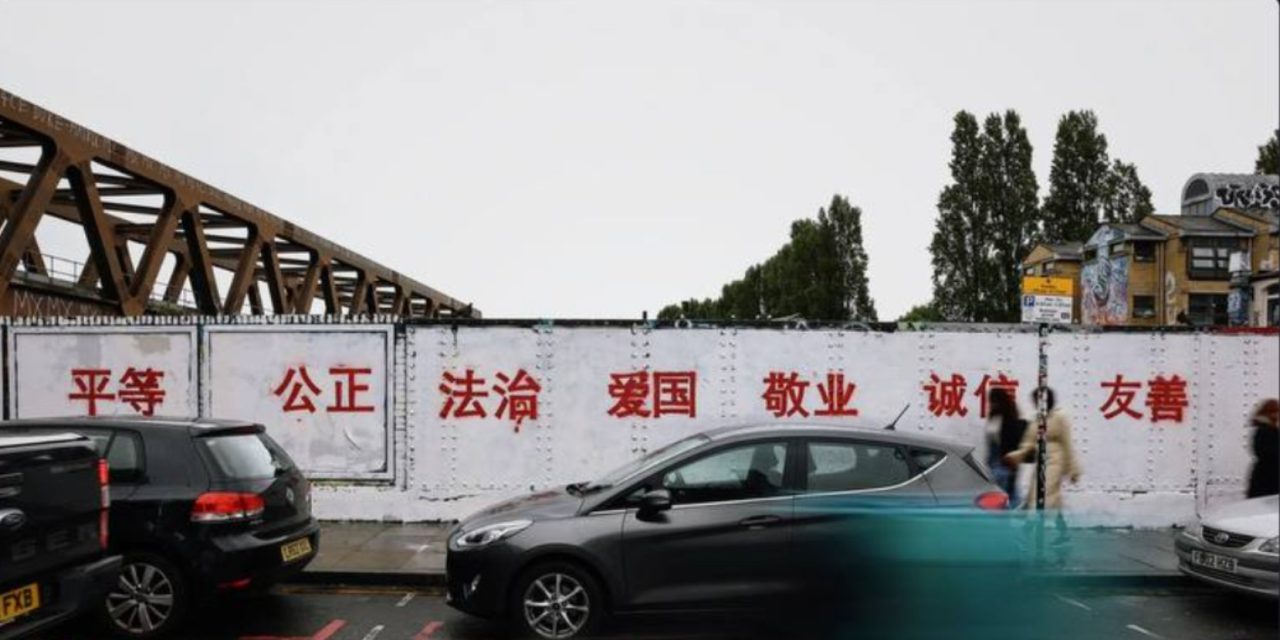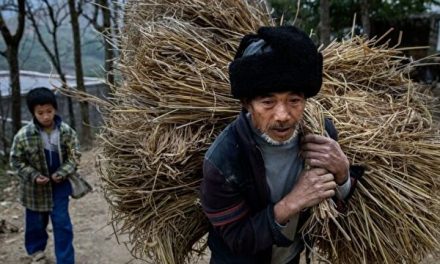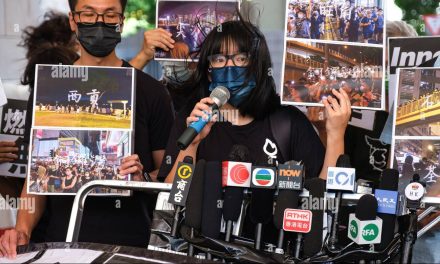By Hua Hu
On August 6, several Chinese students studying abroad stated on such social media as Xiaohongshu [“Little Res Book”] and Instagram that they wrote in red paint the 24-character government propaganda slogan that is common in China on a graffiti wall in London. This graffiti has aroused heated comments, and the foreign students who created it have also been pushed to the forefront of public discussion.
The next day, one student calling himself “Yi Que” who led this creation, issued a statement titled “12 words about the brick lane in East London.” The statement first emphasized the original intention of the creator: “Whether it is defined as social intervention or performance art, I have no political stance, I have no political stance, I have no political stance; I have no political stance.” That Yi Que repeated “I have no political stance? three times obviously indicates its importance, since Yi Que also emphasized, “The work is an artistic expression.”
Are 12 red words painted on a white background on a wall in London an artistic expression? In fact, even if it is such, it is plagiarism at best. Because whether in terms of content or aesthetics, the originality lies not with these few students, but the Communist Party of China (CCP). “Prosperity, democracy, civilization, harmony, freedom, equality, justice, rule of law, patriotism, dedication, integrity, and friendliness,” these 24 words are the core socialist core values proposed by the CCP’s 18th National Congress [in 2012]; this typical socialist propaganda and artistic aesthetic can be seen in the streets and alleys in every village throughout China.
Yi Que repeatedly stating that he has no political stance makes him seem very aggrieved and ridiculous. However, his grievances might be sincere, and he might really feel that expressing CCP ideas is equivalent to “having no political stance.” The reason is that in China’s current context, the lack of a so-called “political stance” means not opposing the CCP. But in actuality, what is politics? Actual politics means not listening to the party and not following the party. If you accept the party-state discourse, it cannot be considered politics. The concept of politics has been alienated in Party culture, and it is a completely different concept from how the term is generally defined around the world. In China, “politics” means “anti-Party, counter-revolutionary” activities, while in a democratic society, it means activities such as democracy, voting, and elections. Therefore, in the CCP view, if one listens to the Party, promoting the core values of socialism is tantamount to “having no political stance.” It can be seen that Party culture and propaganda seems to be a natural thing in China, adopting it a matter of course. The same word “politics” seems to be a different word in the culture of the CCP. It does not have the connotation of “politics” in the rest of modern political civilization, and it can even be said to be the opposite, because it actually connotes “Party culture, Party world.”
This is a typical example of the CCP’s culture polluting the language of modern political civilization. In fact, similar pollution of language is ubiquitous therein. It is the most effective type of CCP brainwashing. Because language is not an empty shell, in practical use it is always consciously or unconsciously guided by a certain ideology (including in education). That is to say, it is impossible to teach via empty language, and the process of teaching language is essentially the process of teaching ideology. In this sense, the process of accepting instruction is also the process of accepting ideology. Yi Que’s understanding of the word “politics” is exactly that.
Such highly polluted words can be seen everywhere in Party culture, such as the 12 words painted on the wall in London: “Prosperity, democracy, civilization, harmony, freedom, equality, justice, rule of law, patriotism, dedication, integrity, amity.” These are the core socialist values proposed by Hu Jintao, general secretary of the CPC Central Committee, at the 18th National Congress of the Communist Party of China in 2012. At the level if the nation-state, the desired values expressed are prosperity, democracy, civilization and harmony; those at the level of society are freedom, equality, justice, and the rule of law; and for the individual citizen the nominal value orientation is patriotism, dedication, integrity, and amity. If these 12 words are separated from the cultural background of the CCP, they are actually very beautiful, but in actual use, especially in Party culture, they have other meanings. The most obvious examples are democracy, liberty, and the rule of law. Although they are literally the same as the words used in modern political civilization worldwide, they do not mean the same thing. These words have become the biggest mask worn by the CCP in its constant series of masquerade balls.
The CCP attitude is actually not unique to this day and age. Since the founding of the People’s Republic of China, its culture has been like a ghost sneaking its way into modern vocabulary bit by bit, gradually changing the meaning of words. For example, the “Republican” in “People’s Republic of China” can be said to be the biggest mask worn by the CCP. Today, this kind of party culture has comprehensively polluted modern Chinese discourse. The pollution of modern political vocabulary has never been more extensive. For example, the modern CCP usage of weida [伟大, which traditionally translates as “magnificent,” “great”] now bears little resemblance to the English word “great.” Hidden changes in what words mean requires vigilance, because the loss of such precise connotations of language is the beginning of the loss of freedom.
As Foucault pointed out, when expounding the power and control over knowledge discourse, all knowledge is a form of power, and this understanding is shared by the controller and the controlled, so the controlled actually is actually implicated in his own control. When Yi Que repeatedly states that he has no political stance, it not only proves that control by Party culture is effective, but also proves that the man himself actively participates in this control. His repeated statement that he has “no political stance” is precisely the stance the Party wants him to have — this is the most frightening part.
Therefore, when a magpie paints the core values of socialism on the walls of London, England, for those who love both the Chinese language and freedom, this is not art, but a kind of damage. The reason is the meaning of those 12 Chinese words have been highly polluted by Party culture, and behind them lie political disasters one after another — isn’t the latest, the current flood disaster in Hebei proof of this?
Photo source: RFI
This piece was translated from Yibao Chinese. If republished, please be sure to add the source and link https://www.yibao.net/?p=247576&preview=true before the text when reposting.
The views of the author do not necessarily represent those of this journal.





















